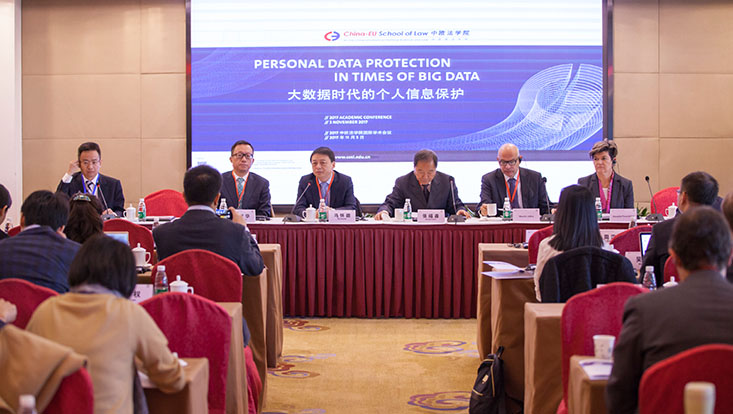2017 Academic Conference: large interest in legal debate on personal data protection in China and Europe
7 November 2017, by Internetredaktion

Photo: CESL
Governmental officials and scholars from China and Europe have cast new light on questions of personal data protection in the age of Alibaba, Amazon, WeChat and Facebook. They discussed the different approaches of the Chinese and European legislative bodies at the China-EU School of Law 2017 Academic Conference “Personal Data Protection in Times of Big Data” at the Beijing Jingyi conference hotel on 3 November 2017. With over 110 participants from governmental institutions and academia, the conference reflected the large interest in the topic.
“Do not copy the European model of individual protection or the US model of risk control and consumer protection, but go beyond these models”, recommended key note speaker Zhou Hanhua from the Chinese Academy of Social Sciences (CASS) to Chinese law makers. In the European Union, the new 2018 General Data Protection Regulation will update the legal framework to meet the challenges of technological development aiming at ensuring protection of personal data and providing legal certainty for economic operators. The regulation was analysed by Prof. Guisella Finocchiaro from the University of Bologna. Chinese legal scholars at the conference held the view that the protection of personal data is important, however, personal information should still be available for commercial purposes. Thus, to increase data protection in China, as Zhou Hanhua put it, “it is important to also motivate market players to improve data protection”.
Is data protection a question of fundamental rights or of property rights?
One legal aspect in particular attracted great interest among the participants: Is the right to personal data protection a fundamental right within the context of human rights or a property right? Prof. Shen Weixing from Tsinghua University regards personal data also as the latter and wants Chinese law makers to refine traditional Chinese property law to go “beyond objects and bodies”. Prof. Wu Jinsong from South China Normal University put forward that scholars should pay attention to government information policies. “We need to find a balance between personal data protection and the public right-to-know.”
Prof. Giovanni Comande from Sant’Anna School of Advanced Studies in Pisa and Dr Joris van Hoboken from the University of Amsterdam pointed out the legal challenges implied by the latest technical developments for collecting data online. The internet of things, smartphones and apps, for instance, produce large amounts of data that easily can be linked to people. They asked how the collection, storage and use of such big data can be better regulated.
The conference was organised by the China-EU School of Law (CESL) at the China University of Political Science and Law (CUPL). Participants came from Chinese governmental institutions such as the National Development and Reform Commission, from universities including Tsinghua, Strasbourg, Maastricht and Central European University, from the embassies of the Czech Republic, the Netherlands, France, Hungary and Germany as well as from global law firms such as CMS.
